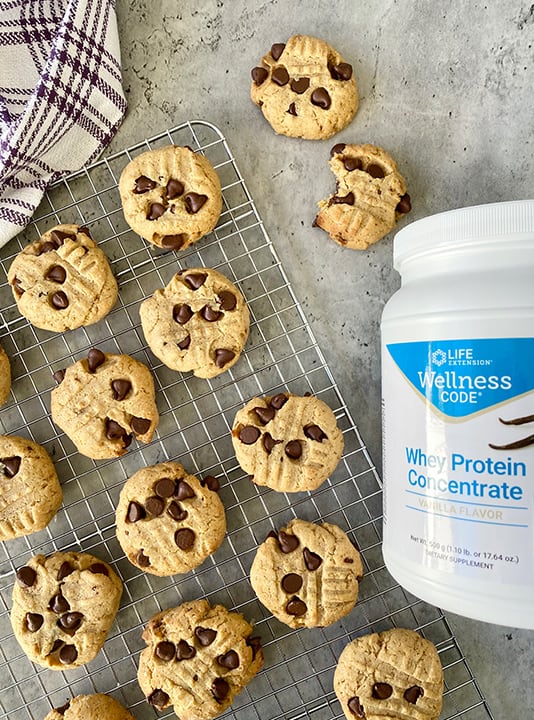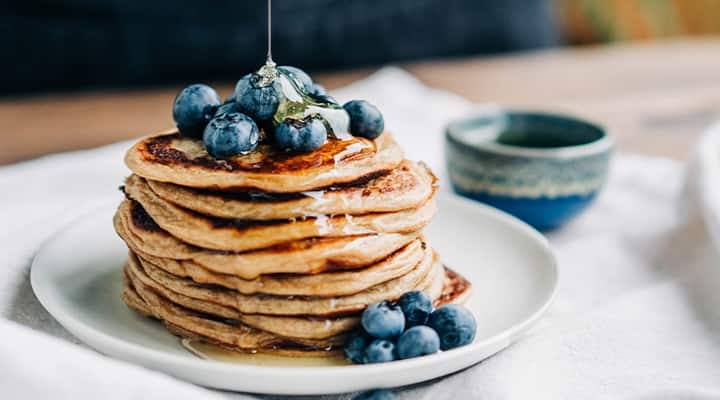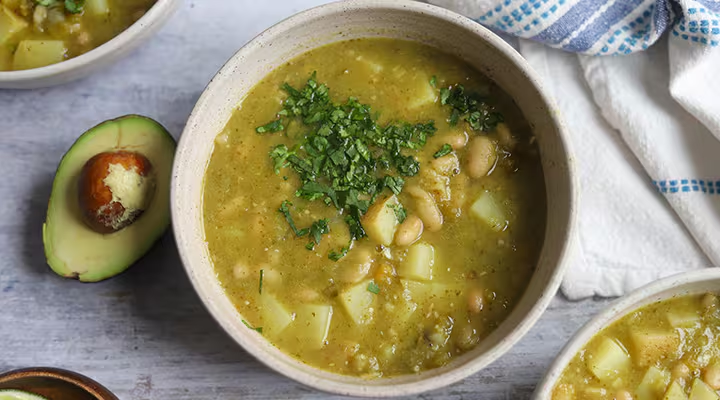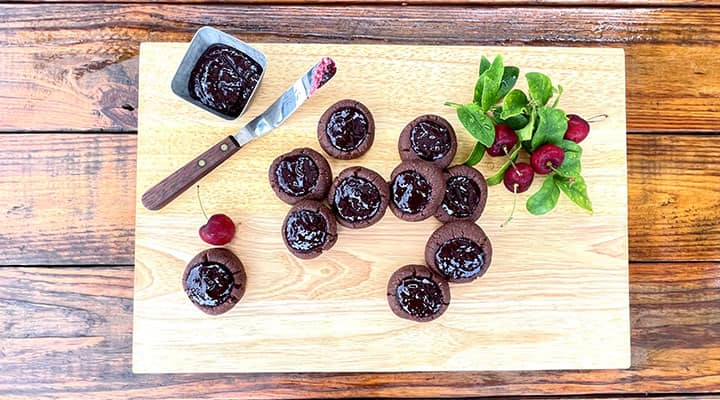
Post Workout Recipe: Protein Powder Chocolate Chip Cookies
Published: February 2022
You worked hard—now for the reward! This easy chocolate chip cookie recipe is great for a post-workout snack because it has whey protein to help build those lean muscles and encourage immune health.
Are protein powder cookies good for you?
There is no denying the deliciousness of cookies. There’s also no denying the importance of having well-balanced, nutritious foods throughout the day. What if you can have both?
The idea that cookies are “bad” for us simply ignores what “good for you” and “bad for you” foods are. As research shows, eating a cookie with a higher protein content actually can be part of your wholesome eating regimen.
So next time you think you can’t have that cookie, think again! Protein powder cookies are a good-for-you way to enjoy a treat, satisfy your sweet tooth, and get more protein into your foods.
What does protein powder do?

Protein powder provides amino acids, which are the building blocks of proteins used by the body. Protein powder has a variety of benefits, whether someone is active with exercise, is seeking to increase protein for overall wellness, or simply is seeking muscle recovery with the support of a protein supplement.
Additionally, protein powder helps to maintain muscle mass and build strength, support healthy muscle function, promote muscle growth when combined with resistance training, and encourage immune system health and longevity.
Do I need to be an athlete to take protein powder?
Nope! Once thought to be just for athletes, whey protein powder has been shown to help fight the effects of time with its muscle, immune and cardiovascular health benefits – and you can get that protein in delicious ways.
Does protein powder make you gain weight?
Weight gain is generally caused by consuming more calories than your body is burning. You may also see weight gain in relation to poor sleeping habits, increased stress, and a sedentary lifestyle, but the imbalance of caloric intake compared with energy expenditure is one of the greatest contributor to weight gain.
What can we learn from this? It isn’t solely about what you’re eating – you must also consider how much you’re eating.
Does protein powder make you gain weight? The short answer is no, it does not. Does too much of something potentially create an excess of another? Yes! Can too much protein result in too many calories and lead to weight gain? Potentially. But protein powder, when properly integrated among other nutrients and a caloric balance, can actually contribute to a well-rounded nutritional intake for your overall health and wellness (calories in vs. calories out).
Picture a buffet: If you were to eat every dish at the buffet, you aren’t going to feel well. If you did this every single day, it’s also likely you’re going to gain weight (because you are taking in more calories than you are burning). Was it ONE thing at the buffet that caused this? No! It was the collective of everything you’re eating.
That is what’s most important when we look at protein powder and protein powder cookies: too much of one thing can create an imbalance. But adding protein powder to your regimen is a small part of the big picture that has benefits for your overall health.
Which protein powder is better for my cookies?

Protein powder is commonly used in a simple protein shake (a mixture of protein powder and water). While this is a quick and effective way to use a protein supplement, it isn’t always the most inviting or palatable. Fortunately, you can find some amazing protein powder dessert recipes. And this is where protein powder cookies steal the show. They are simple to make, they provide more protein than a bakery cookie, and they’re delicious!
There are a variety of protein powders on the market. Life Extension has three of the most common types: whey protein isolate, whey protein concentrate, and pea protein (a vegan protein).
Typically, the protein powders best for baking are whey protein isolate or whey protein concentrate. There isn’t much of a difference between the two when it comes to baking. They both yield a texture that mixes well with your flour, and they often come in a variety of flavors.
Vegan or plant-based proteins aren’t typically recommended because they have a different consistency than whey protein. However, if you do use a pea protein in baking, simply ensure that the consistency of your cookies resembles cookie dough (versus being too thick or too thin with an inability to form them into balls to bake).
Explore Our Best Active Lifestyle & Fitness Supplements
Recipe for Peanut Butter Chocolate Chip Protein Cookies

Ingredients:
- 1 cup creamy peanut butter
- ¼ cup almond flour
- ¼ cup honey
- 1/2 cup coconut sugar
- 2 eggs
- 3 scoops Life Extension® Vanilla Whey Concentrate (or isolate)
- ⅓ cup dark chocolate chips
Directions:
- Combine all ingredients, excluding chocolate chips.
- Once dough has formed, stir in chocolate chips.
- Form dough into balls and place on baking sheet. Flatten with a fork.
- Bake at 350 degrees Fahrenheit for 10-12 minutes (until edges become golden).
Recipe Tips For Success:
What’s most important when baking with protein powder is the consistency of your dough. If you picture a standard cookie dough, the consistency is something that can be molded. It’s not a thick liquid like a muffin batter, and it’s not so dry that the dough won’t stick together.
If you find that your dough is too dry, add a bit of honey or an egg white to your batter. If your dough is too liquid, add protein powder or almond flour. Making these adjustments will also teach you how to get more creative with your baking, which yields many more possibilities for creations.
Speaking of many more possibilities, these cookies are already gluten free and use honey as a partial sugar alternative. You can use all-purpose flour or oat flour in place of the almond flour if you’d like, and you can swap out honey for maple syrup, too.
When should I eat a protein cookie?

It’s a cliche to go to the gym and then eat your protein, but it’s beneficial to ensure you are ingesting protein after a workout. Exercise is a stimulus that increases muscle protein synthesis. Optimal post-exercise recovery is achieved through protein in your diet (whether through a food source or a supplement).
Both whey protein isolate and whey protein concentrate are great options to use for baking cookies, making a protein shake, or even adding to a smoothie after your workout.
Optimal protein intake is often underestimated, so it’s possible you need to eat more protein than you are right now.
Is it okay to eat protein cookies without a workout?
Having adequate protein as part of your daily nutritional intake is important for everyone, regardless of whether you’re working out. It becomes more important if you are seeking to enhance your muscle recovery, but protein is an essential macronutrient for everyone.
And it’s okay to love cookies! In fact, it’s a great thing to love cookies! Ensure that your overall nutritional intake is balanced and supportive of a lifestyle that is sustainable for you. Try a peanut butter chocolate chip protein cookie knowing that you’re enjoying a delicious snack and fueling yourself with healthy nutrition.
References
- Goubgou, Mahamadé, et al. “Biscuits: A Systematic Review and Meta-Analysis of Improving the Nutritional Quality and Health Benefits.” Food Prod Process and Nutr., 2021, https://www.ncbi.nlm.nih.gov/labs/pmc/articles/PMC8483942/
- Howell, Scott et al. “‘Calories In, Calories Out’ and Macronutrient Intake: The Hope, Hype, and Science of Calories.” Am J Physiol Endocrinol Metab. November 2017, https://doi.org/10.1152/ajpendo.00156.2017
- Pasiakos SM, et al. “The effects of protein supplements on muscle mass, strength, and aerobic and anaerobic power in healthy adults: a systematic review.” Sports Med., January 2015, https://pubmed.ncbi.nlm.nih.gov/25169440/
- Van Vliet, Stephan, et. al. “Achieving Optimal Post-Exercise Muscle Protein Remodeling in Physically Active Adults through Whole Food Consumption.” Nutrients, February 2018, https://www.ncbi.nlm.nih.gov/labs/pmc/articles/PMC5852800/
- “Whey Protein.” Mayo Clinic, https://www.mayoclinic.org/drugs-supplements-whey-protein/art-20363344
Like what you read?
Please subscribe to get email updates on this blog.




